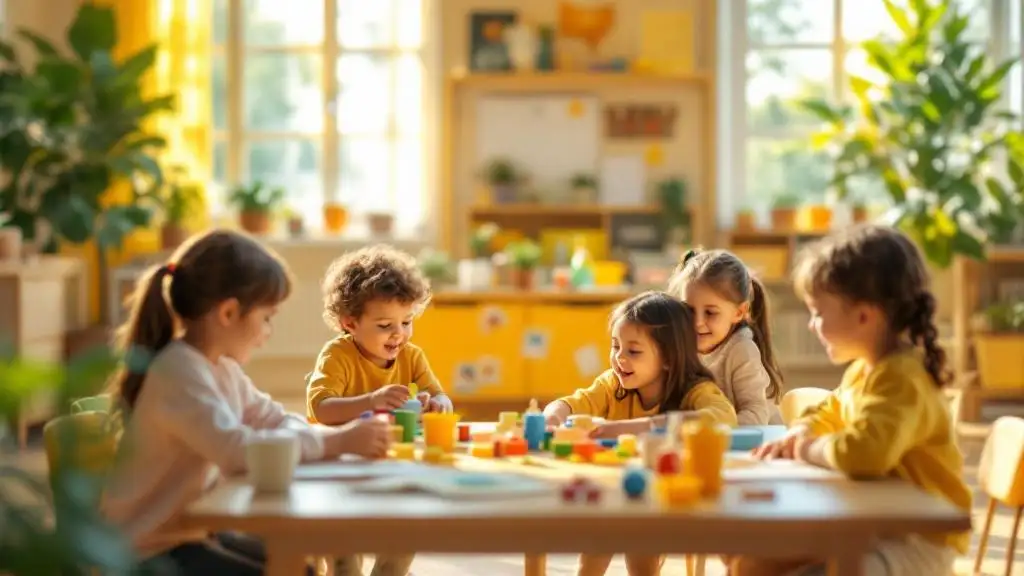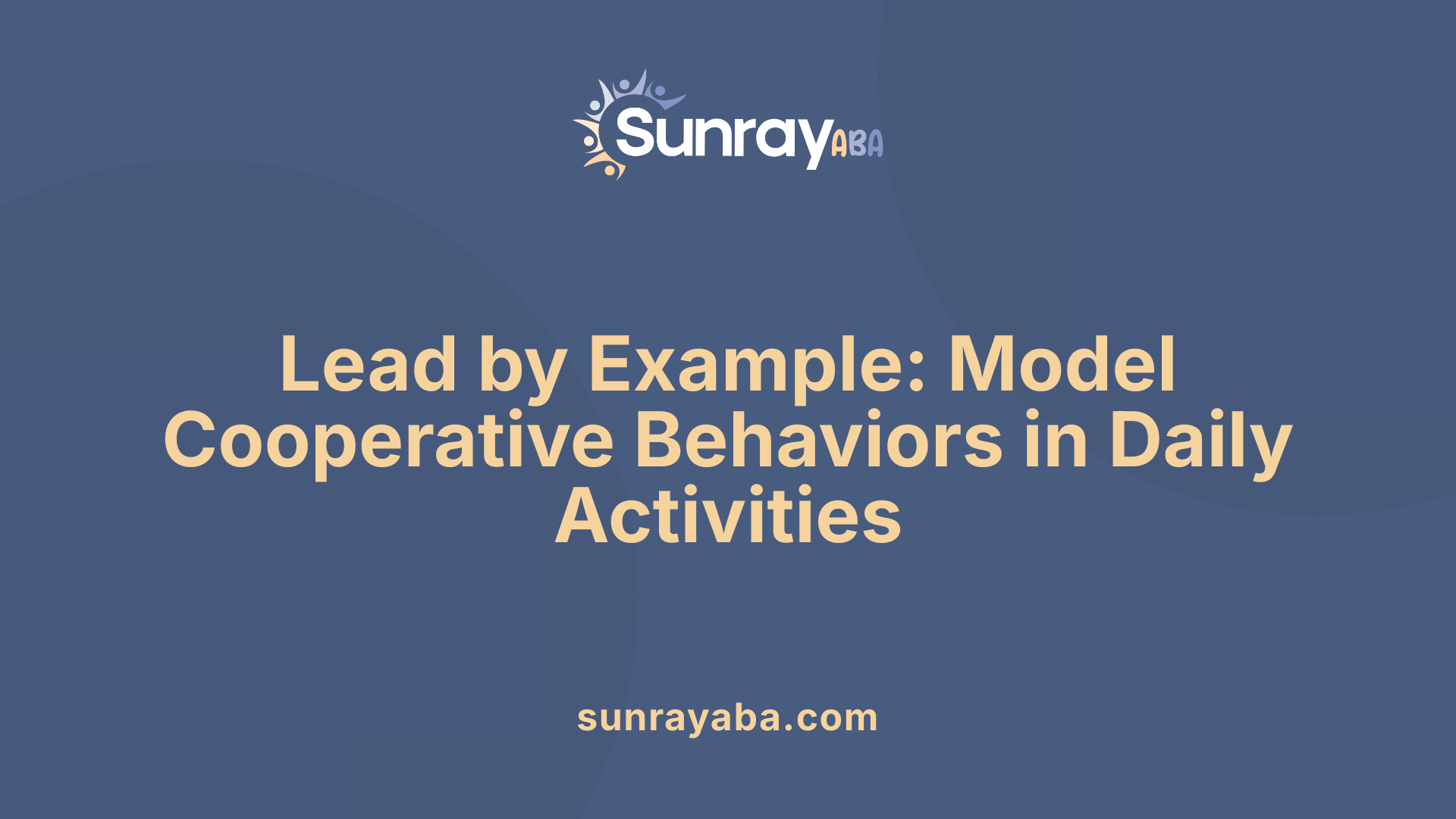Helping Kids Build Cooperation Skills

Understanding the Foundations of Cooperation in Children
Helping children develop cooperation skills is essential for their social, emotional, and cognitive growth. From early childhood, children begin to learn the importance of sharing, taking turns, and working together, which are vital components of social competence. Effective guidance from parents, educators, and caregivers can foster these skills through various practical strategies, activities, and an environment that supports inclusive, respectful, and collaborative interactions.
The Role of Modeling and Play in Building Cooperation Skills

What tips can parents, educators, and caregivers use to develop children's cooperation abilities?
Helping children learn to cooperate effectively starts with consistent and intentional strategies. Parents, teachers, and caregivers can begin by modeling cooperative behaviors themselves, such as sharing, listening, and collaborating. This demonstrates to children how to act in social situations.
Incorporating play-based activities is also crucial. Simple games that involve turn-taking, sharing toys, and group problem-solving encourage children to practice cooperation naturally. Activities like cooperative storytelling, building projects, and role-playing games foster communication, patience, and teamwork.
Providing children with choices in their play and daily routines helps build their confidence and independence, reinforcing their ability to make decisions and respect others' opinions.
Positive reinforcement is vital. Praising children when they share or work together encourages them to repeat these behaviors. Talking openly about feelings and empathy during play or routine interactions helps children understand how their actions affect others.
Creating an environment that values cooperation—setting clear expectations, providing adequate resources, and encouraging collaborative efforts—supports long-term social skill development. Patience and ongoing guidance, including reflection on experiences, allow children to internalize and practice these skills over time.
Effective Use of Play and Cooperative Activities

How does play serve as a method for teaching cooperation?
Play is a natural and effective way for children to learn cooperation skills. During playtime, children observe and imitate behaviors such as sharing, taking turns, and working towards common goals. Cooperative play, which involves activities like building a fort, role-playing as a veterinarian, or participating in obstacle courses, helps kids develop social skills like communication, problem-solving, and empathy.
Activities that require teamwork, such as group puzzles or building projects with LEGO DUPLO, encourage children to listen to each other, negotiate, and share ideas. Play also provides a safe environment where children can practice conflict resolution and emotional regulation while supporting each other.
By engaging regularly in these activities, children learn the importance of patience, trust, and mutual respect, laying the foundation for healthy social relationships.
What are some types of cooperative activities and games?
Cooperative activities encompass a wide range of games and exercises designed to promote collaboration. Examples include:
| Activity | Description | Social Skills Developed |
|---|---|---|
| Team scavenger hunt | Children work together to find items based on clues | Teamwork, navigation, shared goal setting |
| Building a tower challenge | Groups create the tallest tower using blocks or materials | Planning, patience, problem-solving |
| Human knot | Kids hold hands and untangle themselves without letting go | Communication, patience, flexibility |
| Pass the story | Each child adds to a story, building collective creativity | Listening, turn-taking, creativity |
| Obstacle course challenge | Teams complete physical tasks while supporting each other | Trust, cooperation, perseverance |
Structured activities like 'Twist Relay Races' and 'Group Art Projects' foster dynamic collaboration, while games like musical chairs—team edition—encourage kids to work together and adapt to rules.
How do outdoor and community activities promote teamwork?
Outdoor and community settings expand opportunities for children to practice teamwork in real-world contexts. Participating in sports such as soccer or relay races teaches children about cooperation, fairness, and handling competition healthily. Gardening projects or community clean-up activities promote responsibility, leadership, and group effort.
Programs like Mission Grit employ the S.P.I.R.I.T. Method—focusing on science, problem-solving, respect, and teamwork—to nurture these skills in diverse environments. These activities help children understand the benefits of cooperation beyond the classroom, reinforcing social-emotional development and preparing them for future social interactions.
By engaging in both structured and unstructured team activities, children develop confidence and a sense of belonging, which are vital for their overall growth and success in social settings.
Games that Cultivate Collaboration and Problem Solving

What are some effective games and activities that encourage collaboration among children?
Children learn vital social skills such as cooperation, communication, and conflict resolution through fun and engaging activities. Cooperative games like Cooperative Hoops, Hoop Pass, Balloon Bop, and Look Ma, No Hands! are excellent choices. These games emphasize shared objectives, encourage sharing and encouragement, and involve children working together to achieve common goals.
These activities are inclusive and designed to be active and enjoyable for children across different ages. They foster essential social abilities such as teamwork, empathy, and patience. For instance, building forts or participating in cooperative board games provides opportunities for creative collaboration. Role-playing as superheroes or engaging in group art projects encourages children to work together, support each other, and develop a sense of camaraderie.
Structured team-building activities like relay races and strategic games such as Forbidden Island challenge children’s problem-solving skills and promote trust within the group. Storytelling exercises also enhance communication and strategic thinking.
Incorporating a mixture of physical, strategic, and creative cooperative activities not only makes learning fun but also helps children develop a well-rounded set of social skills. These activities are particularly effective because they motivate children to collaborate actively, build trusting relationships, and enjoy the process of working together.
| Game/Activity | Focus Area | Benefits | Suitable Age Range |
|---|---|---|---|
| Cooperative Hoops | Teamwork, sharing | Encourages sharing and social interaction | 4+ years |
| Hoop Pass | Communication, cooperation | Builds coordination and patience | 4+ years |
| Balloon Bop | Physical activity, teamwork | Promotes active engagement and patience | 3+ years |
| Look Ma, No Hands! | Inclusive fun, sharing | Fosters inclusive play and encouragement | 4+ years |
| Building forts | Creativity, collaboration | Develops planning and joint effort | 3+ years |
| Cooperative board games | Strategic thinking, patience | Enhances problem-solving and teamwork | 5+ years |
These activities help children build social competence and enjoy meaningful interactions, setting a foundation for positive relationships in school and beyond.
Teaching Techniques for Young Children's Cooperation and Problem-Solving

What techniques can be used to teach young children cooperation and collaborative problem-solving skills?
Fostering strong cooperation and problem-solving abilities in young children involves creating a nurturing environment that emphasizes empathy, communication, and mutual respect. One effective approach is to use turn-taking during activities, helping children learn patience and fairness. Explaining rules clearly and visually can prevent confusion and promote understanding.
Encouragement through positive reinforcement plays a vital role. Praising children when they share or work together encourages them to repeat those behaviors. Specific praise, like acknowledging helpfulness or teamwork, boosts confidence and reinforces good social habits.
In addition, engaging children in activities that require teamwork fosters essential skills. Collaborative tasks such as building projects, puzzles, or role-playing scenarios help children practice sharing ideas, negotiating, and resolving conflicts.
Providing opportunities for open dialogue is crucial. Asking children why they made certain choices or how others might feel encourages perspective-taking and empathy. Modeling calm problem-solving behaviors, especially during conflicts, shows children how to approach challenges constructively.
Creating a supportive environment involves routine activities that promote cooperation, like chores or group art projects, where children learn to work together towards common goals. Using visual cues and skill visuals to guide behavior, and giving children choices within rules, helps develop their decision-making skills.
Overall, these strategies—combining structured activities, positive reinforcement, and empathetic communication—equip children with the tools to collaborate effectively, setting a foundation for their lifelong social and emotional growth.
Developmental Milestones and Age-Appropriate Cooperative Skills
How does cooperation develop in early childhood?
Cooperation is a skill that blossoms during the early years of life. It begins as infants start to understand that their needs can be met and that they can wait for their turn by around 3 months. This early sense of patience and expectation marks the initial step toward cooperation.
By approximately 14 months, children are able to participate in simple joint activities such as helping with chores like laundry and beginning to grasp how family members work together. These activities foster basic cooperation and social bonding.
At around 30 months, children further develop their social skills by learning to resolve conflicts, cope with disappointment, and build deeper relationships through engaging in cooperative play. Activities like building a tower with blocks, role-playing as a veterinarian, or participating in group art projects help children practice sharing and teamwork.
As children grow older, their ability to share, take turns, and collaborate becomes more sophisticated, which supports their emotional development and friendship building. Providing age-appropriate activities and consistent guidance encourages children to develop these cooperation skills at each stage.
What are age-appropriate cooperative activities and behaviors?
For infants and toddlers, simple activities like playing peek-a-boo or passing toys help introduce the concept of taking turns.
Preschoolers and older children can engage in more complex tasks such as building a fort together, participating in group sports, storytelling games, or collaborative art projects. These activities teach patience, fairness, and teamwork.
Strategies like using visual cues, clear instructions, and positive reinforcement—such as praising sharing behaviors—are effective in guiding children through their developmental journey.
How can caregivers support children at different developmental stages?
Providing consistent opportunities for cooperation, tailored to each child's age, is essential. For infants, this means offering simple joint activities that promote understanding of patience and mutual needs.
For toddlers, engaging them in chores, simple problem-solving games, and family routines helps reinforce cooperative behavior.
Preschool programs focus on role-play, teamwork, and conflict resolution activities, which develop communication and social skills.
Using encouragement, modeling, and discussing emotions fosters empathy and understanding of how actions affect others. Routine reflection and feedback, along with playful learning, create an environment where children can safely practice and enhance their cooperation skills.
By understanding these developmental milestones and providing suitable activities, caregivers can greatly support children’s journey toward becoming cooperative and socially adept individuals.
The Significance of Recreational Play for Social and Emotional Development

How does play foster social skills?
Recreational play is fundamental in helping children develop vital social skills. Through activities such as sharing toys, taking turns, and cooperating in group settings, children learn to communicate effectively and respect others. Play encourages patience, empathy, and understanding, which are necessary for forming healthy relationships.
Group games and team activities promote teamwork, negotiation, and conflict resolution. Children learn to listen, support peers, and work toward shared goals—all critical components of social competence. Playing with others in structured and unstructured ways creates a safe space for children to practice emotional regulation and develop confidence in social situations.
What is the role of pretend and role play?
Pretend play and role-playing are powerful tools for social and emotional learning. They allow children to explore different roles, emotions, and perspectives, fostering empathy and emotional awareness. When children act out scenarios as doctors, teachers, or family members, they understand others’ feelings and develop a sense of fairness.
Role play also helps children practice problem-solving and negotiation skills in a fun, engaging environment. These activities often involve cooperation, turn-taking, and sharing, reinforcing important social behaviors and supporting emotional resilience.
What are the benefits of recreational play for confidence and resilience?
Engaging in recreational activities boosts children's confidence as they succeed in new challenges and master new skills. Successfully navigating play scenarios and social interactions affirms their abilities and encourages independence.
Furthermore, play helps build resilience by teaching children how to cope with setbacks, disappointment, and conflicts. Supportive play environments enable children to recover from errors, adapt to changes, and develop a positive outlook. Over time, these experiences foster emotional strength and self-reliance.
| Aspect | Benefit | Example Activities |
|---|---|---|
| Social Skills | Enhances sharing, turn-taking, and teamwork | Group games, role-playing |
| Emotional Growth | Builds empathy, understanding feelings, emotional regulation | Pretend play, story-telling |
| Confidence & Resilience | Fosters independence, problem-solving, and adaptability | Challenges during play, sports |
Overall, recreational play—including group games, pretend and role play—serves as a foundation for lasting social and emotional wellbeing. It equips children with the interpersonal skills needed to navigate their social world confidently and compassionately.
Creating Inclusive and Supportive Environments
How can caregivers create inclusive environments that promote social cooperation among children?
Creating a space where all children feel valued is essential for fostering cooperation and empathy. Caregivers can start by modeling respectful and kind interactions, showing children how to treat others with understanding. Incorporating an inclusive curriculum that reflects different cultures, backgrounds, and experiences helps children appreciate diversity from an early age.
Physical spaces should be accessible and welcoming. This includes creating cozy areas for quiet reflection as well as open spaces for group activities. Using social scripts, buddy systems, and visual cues supports children in navigating social interactions, especially those who may need extra help with communication.
Consistent staff training equips caregivers with current best practices for inclusion and diversity. Engaging families and the wider community reinforces these values beyond the classroom or play area. Celebrating different cultural traditions and involving families in inclusive activities builds a stronger sense of belonging.
Overall, fostering an environment that recognizes each child's uniqueness encourages empathy, patience, and cooperation. Such settings nurture positive social skills that last a lifetime, leading to healthier relationships and better social understanding.
Nurturing Cooperative Growth for Lifelong Success
Building cooperation skills in children is a dynamic process that requires patience, consistent practice, and a nurturing environment. By modeling cooperative behaviors, engaging children in meaningful play and activities, and fostering inclusive spaces, caregivers can equip children with the social and emotional tools needed for successful relationships and lifelong collaboration. Developing these skills early helps children navigate social challenges, build confidence, and contribute positively to their communities, laying the foundation for a future of mutual respect and teamwork.
References
- Strategies for Teaching Sharing and Cooperation - Kids Campus
- 10 Fun Cooperative Games for Kids to Build Collaboration Skills
- Tips on Helping Your Child Learn to Cooperate - Zero to Three
- Teaching Children Independence and Cooperation: Finding a Balance
- Benefits of Teamwork for Kids and How to Teach It - Mission Grit
- 12 Easy Ways: Teaching Collaboration Skills to Students - 21K School
- 10 Engaging Activities to Build Cooperative Skills for Kids in Speech ...